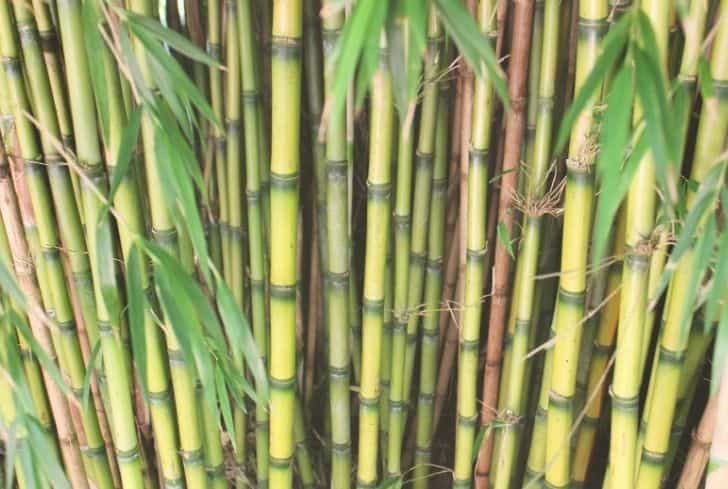Bamboo is much closer to replacing plastic than it was when it was first introduced. Now, we all know plastic is a very versatile material – manufacturers can use it to make anything. That’s why it’s been a bit challenging to find a material that’s nearly as versatile.
However, it’s been done! A bamboo is a preferable option because it’s better for the environment. It’s cheaper, too; bamboo is a natural resource that grows at the rate of about 48 inches every day. Its production process is also pretty straightforward and doesn’t require too many natural and artificial resources.
Again, despite consumers’ quick acceptance of bamboo products as a better alternative to plastic, environmentally conscious individuals still, ask if bamboo is biodegradable. Will it break down fast without harming the environment?
Read: Is Bamboo Recyclable?
Read: Is Bamboo Compostable?
Well, that’s the aim of this blog post. We’ll also answer questions relating to the biodegradability of other bamboo products. Dive in.
Does Bamboo Biodegrade?
Bamboo is now fast replacing plastic and a range of other production materials. As a result, we own more and more bamboo products. So, if you’re environmentally sensitive, it’s only natural to wonder if bamboo is biodegradable. After all, when a material is biodegradable, disposing of it will be the easiest thing to do.
Is bamboo biodegradable? It certainly is. It comes from nature and will break down under the right conditions. Once moisture, heat, oxygen and microorganisms are introduced to bamboo, it’ll break down fast, sometimes within the space of 8 weeks or even less.
As a result, any bamboo material that makes its way to a landfill will decompose within a short period. You can also put your old bamboo products in your compost pile at home. They break down as fast as the other materials and provide your plants and soil with the required nutrients.
Is Bamboo Toilet Paper Biodegradable?
Bamboo toilet paper is fast replacing conventional toilet paper as consumers are becoming more eco-conscious. Understanding the benefits of bamboo toilet paper means understanding that they are highly versatile, very soft and strong, and durable.
Traditional toilet paper can clog your pipes, especially when it’s too thick or too much, like double-ply toilet paper. Unlike these, however, bamboo toilet paper breaks down easily in water and flows so easily through your toilet, making using the bathroom comfortable and easy.
Due to its growing popularity, many eco-conscious consumers have begun to wonder whether they are environmentally friendly. The simple answer is yes.
Bamboo toilet paper decomposes quickly and leaves no evidence of its existence, unlike regular toilet paper, which can take years to break down completely.
As a result of the biodegradability of bamboo toilet paper, it reduces the impact on landfills. This means it does not occupy unnecessary space in landfills for ages.
It also helps to improve the quality of the soil and reduces the amount of leftover and unusable by-products of production.
Is Bamboo Plastic Biodegradable?
Most homes are filled with plastic products, but many homeowners are waking up to the “green gold” of today – bamboo. As a result, the world sees a steady increase in consumers buying and using more bamboo products than plastic products.
As an environmentally-conscious consumer, you’ve likely gone into a supermarket wanting to get environmentally friendly plastic cups or bowls for your home or even food plates for your kids or plastic storage and see them marked with a ‘made with bamboo‘ sign. You may have wondered why plates and cups made from bamboo feel a lot like plastic.
These products are produced from bamboo plastic composite, popularly known as BPC. BPC is bamboo fibers mixed with epoxy resins which are polymers that can be called plastics. The bamboo fibers are the component that makes the product light and strong.
As for the biodegradability of bamboo plastics, it isn’t easy to ascertain due to the combination of materials used in its manufacture. Whether or not they are biodegradable depends on the polymers and other chemicals used in producing them.
Naturally, bamboo fibers are biodegradable, but when mixed with other chemicals and materials such as epoxy resins, they can hinder the decomposing process.
In addition, epoxy resins come in different types and therefore might not biodegrade. Some, however, can be broken down naturally under suitable conditions such as temperature changes and weathering.
Also, the type of microorganisms that are present in the given environment can determine its degradability. Some bamboo plastics that degrade in open air may not degrade in the same way in landfills or even underwater. We need industrial composting will be to provide a suitable environment for these products to decompose.
The difficulty, however, comes from knowing which types of epoxy resins or other chemicals and additives have been used in the manufacture of these bamboo plastics. But using bioplastics, plastics that have their major component made from crops can reduce the environmental impact of bamboo plastics.
Is Bamboo Cutlery Biodegradable?
Ever thought of switching up your one-use flatware game? Bamboo cutlery is a great way to add some edge to your parties or your kitchen. They are reusable and are made using bamboo that’s sustainably farmed.
They are strong, light, portable and durable. These products are 100 percent organic. The bamboo used for cutlery is grown without pesticides.
Since bamboo is biodegradable, it decays easily. The same applies to cutlery made from bamboo. It’s purely organic and does not require any special process to get rid of it. You can throw it in a green waste bin for it to be sent to a landfill.
However, if your bamboo cutlery sets are machine-made, they are probably made with chemicals and might take a lot longer to decompose and sending them to a landfill is probably not a good idea.
Bamboo cutlery sets are compostable as well as recyclable.
Is Bamboo Paper Biodegradable?
The demand for paper has been growing globally over the past few years despite technological advancement. Most individuals and organizations looking for sustainable and environmentally friendly printing solutions have now begun to turn to bamboo papers because of their strength, brightness, and printability.
Despite this, there have been growing concerns about its sustainability and biodegradability.
Bamboo itself is a biodegradable material and breaks down easily. Bamboo paper can therefore be easily disposed of when not in use anymore and will decompose over time.
While manufacturing bamboo papers, the biodegradability property is preserved by applying a compostable coating, against moisture and grease, to the bamboo paper products.
How Long Does Bamboo Take to Biodegrade?
There’s a total of about 1500 different kinds of bamboo that grow almost everywhere in the world, including Thailand, Vietnam, Indonesia, and some parts of Africa, South America, and Australia.
Due to its sustainable properties, bamboo has been used to make various products we have discussed above. However, the question on everyone’s mind remains whether or not bamboo is recyclable. And how can you dispose of it if it’s not recyclable?
Bamboo can be recycled, but bamboo products that have been mixed with other chemicals and materials cannot be recycled. They can, however, be disposed of because the bamboo itself is biodegradable.
Cutting old bamboo products into smaller pieces helps prepare them to biodegrade as it reduces the amount of time it takes to decompose. All bamboo products, whether or not they contain chemicals, are biodegradable.
However, it’ll take a longer time for bamboo products that have other materials in them to degrade as opposed to organic bamboo.
Bamboo products that are natural and inorganic can be disposed of in a green waste bin. But just like other materials that go into this bin, it’s important to clear your bamboo products of any artificial material that may be attached to them.
For example, you might want to remove the razor blade part of a bamboo shaving stick or the bristles of a bamboo toothbrush before throwing it in the green waste bin.
It’s important to note that all species of bamboo are biodegradable. But certain conditions help speed up or slow down the degradation process, however. They include; direct contact with soil, exposure to rain or sun, and changing climatic conditions such as changes in temperature or humidity.
The time frame for the biodegrading process of bamboo products differs. But there are approximate time frames for different bamboo products.
For example, an untreated bamboo pole takes about 4-8 years to decompose completely, a bamboo toothbrush takes about 6 months or more, a bamboo cup and a bamboo straw and bamboo clothing take roughly more than a year. In contrast, bamboo cutlery takes about 2 months.
How Do You Dispose of Bamboo Waste?
Bamboo products are great to have because when you no longer have any use for them, they can be easily disposed of.
Although there are several ways to dispose of your bamboo products without causing harm to your environment, it’s important to make sure you are putting your bamboo product properly when disposing of it.
1. Compost Them
Composting is a great way to dispose of your bamboo products. Bamboo has a high silica content, which it releases into the soil when it breaks down.
Silica can help plants become more drought-resistant, increase crop yields, and generally improve crop quality as the soil becomes nutrient-rich. In addition, silica strengthens cell walls and protects against fungal diseases like powdery mildew.
You can put your old bamboo products in a worm composter. This is called vermicomposting. As recommended when composting, your bamboo products have to be shredded into pieces before dropping into a worm composter. This makes it easier for them to feed on the bamboo.
You can also soak the bamboo product in hot boiling water for about an hour or more before dropping it in the worm compost bin. This makes the bamboo softer for the worms to digest.
2. Repurpose them
Bamboo products can also be reused and turned into something new. For example, your bamboo toothbrush can be used as a DIY for a picture frame or a paint stirrer.
They can also be used as cleaning materials for spaces that’re small, narrow and hard to reach or even clean electrical appliances with little spaces in them like keyboards.
Bamboo toothbrushes can also be used as plant labels for those who have gardens at home. You can reuse bamboo coffee cups to make mini plant holders by adding soil, water and tiny plants. They can also be used as DIY pens and crayon holders. Finally, bamboo stalks can make great stakes for plants in the garden.
Conclusion
We can’t underestimate the relief bamboo products have brought to the environment. They’re excellent replacements for plastics, which are very harmful to the environment and living creatures.
However, they can’t last forever, so we need to consider all the ways we can uniformly dispose of them.






